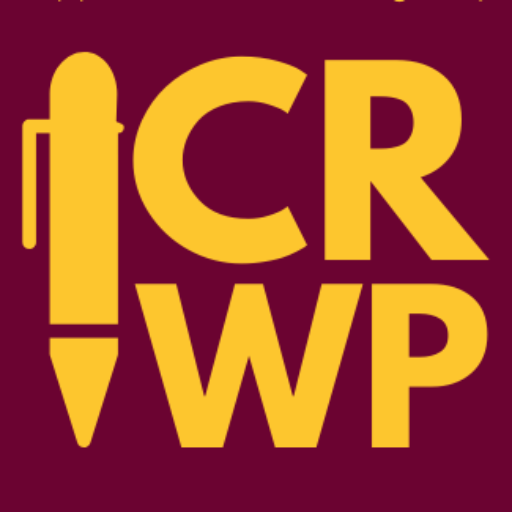The CRWP Teachers As Writers Blog will feature guest posts in July in advance of the National Writing Project Midwest Conference. The NWP Midwest Conference takes place August 3, 4, and 5 in Madison, Wisconsin, and will feature presentations from NWP Teacher Leaders and Site Directors, as well as a keynote and pre-conference from the CRWP’s own Troy Hicks. Today’s post comes from Andrea Marshbank of the Flint Hills Writing Project in Kansas.
Google and I have a complicated relationship.

Living in these futuristic times, I turn to Google regularly for my questions. I am no stranger to yelling “Hey, Google!” at my innocuous Google Home to find out the correct pronunciation of whomst, if it’s supposed to rain today, or prove my partner wrong—or right—over simple controversies.
As a teacher, I struggled with how to approach Google with my students. Is relying on Google for our questions a crutch? Is my refusal to find the thesaurus or watch the weather report a manifestation of my laziness that is enabled by Google’s handiness? After much reflection, I have determined that Google is probably not evil. Or if it is, it’s a necessary evil. Finding information on the internet without Google, or the use of another corporate search engine, would be incredibly difficult. So, out of hope for humanity, I’m going to go ahead and believe that Google is not 100% evil.
Google is, however, a business. And, like all businesses, it doesn’t necessarily have our best interests at heart. In April, Vox reported that Professor Safiya Noble of the University of Southern California was writing a book entitled Algorithms of Oppression: How Search Engines Reinforce Racism. Dr. Noble warns her readers about the intent of search engines (read: Google) who prioritize getting clicks, and making money, over providing ethical search results.
In one example, Dr. Noble highlights how Google’s image results for searching for women of different ethnicities have incredibly different results. A Google search for the term “white women” provides pictures of, you guessed it, white women. A whole page of them appearing professional and poised. However, a similar search for “black women” sports images that are highly sexual, if not pornographic. If the algorithms can’t help but create a spew of racist results, then perhaps Google needs to rethink the use of algorithms. But, I digress.
Google is a tool that can make our forays into the vast internet manageable. Our students need to know how to use it effectively while acknowledging its advantages and disadvantages. We are in such technological times that knowing how to search the internet is one of the most important skills we can teach our students. For research purposes, yes, but also for life. As educators, we want our students to problem solve. As 21st-century citizens, a good amount of problem solving is knowing how to “just Google it.” We have to prepare our students with a 360-degree view of search engines, how to use them well, and when to not use them at all.
Teaching students to evaluate search engines is not a job that is limited to the computer lab teacher, the mandated digital citizenship lessons, or a one-day crash course right before the big research project. Knowing how to effectively search the internet has to be an ongoing conversation between students and teachers at a variety of ages and in all classes. We have to be willing to have philosophical conversations about open-ended questions like, When is it okay to Google for information? How can I verify that the information I Googled is true? Why wouldn’t it be true? If I can’t trust Google, who can I trust?

If you’re reading this on CRWP Teachers as Writers Blog and are seriously questioning what this has to do with writing, I’ll tell you: everything. Writing, both fiction and nonfiction, requires research. Sometimes that research is our own life, specifically when we are writing reflectively. In that case, there is no need to Google. We were there. When we write about situations that we weren’t a part of, we’re naturally going to turn to search engines like Google to figure out what we need to know. Our students will, too. We need to prepare them.
Searching the internet for trustworthy sources is incredibly important. Our students need us to spark these conversations for them to consider. I’m excited to have more conversations about Googling and online literacy when I meet with other educators at my presentation at the NWP Midwest Conference in August. My session is entitled, “Who Can You Trust?: Teaching Online Research Literacy.” I hope to see you there! If you can’t make it, here’s a link to my slideshow.
 Andrea Marshbank is a high school English teacher in Kansas. As a Teacher Leader for the Flint Hills Writing Project, host of an education podcast called The Suggestion Box, and the sponsor of her school Writing Club, Andrea is constantly looking for ways to positively contribute to the education community. Find her blog at themarshbankclassroom.com and more information on her podcast at thesuggestionboxpodcast.com.
Andrea Marshbank is a high school English teacher in Kansas. As a Teacher Leader for the Flint Hills Writing Project, host of an education podcast called The Suggestion Box, and the sponsor of her school Writing Club, Andrea is constantly looking for ways to positively contribute to the education community. Find her blog at themarshbankclassroom.com and more information on her podcast at thesuggestionboxpodcast.com.

This work is licensed under a Creative Commons Attribution-NonCommercial-ShareAlike 4.0 International License.

Leave a Reply
You must be logged in to post a comment.